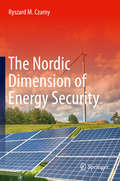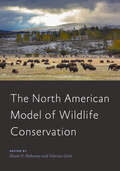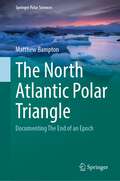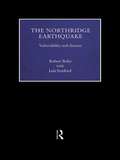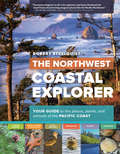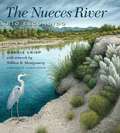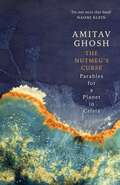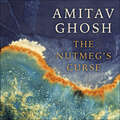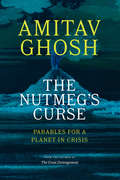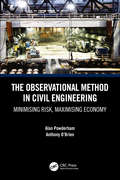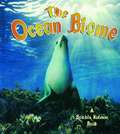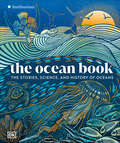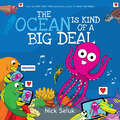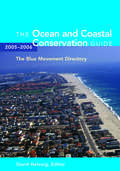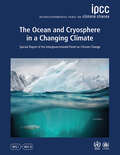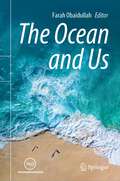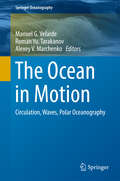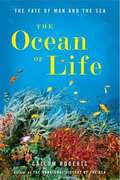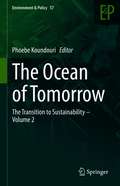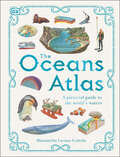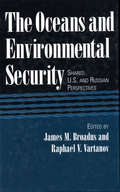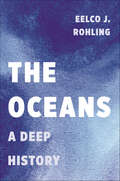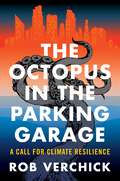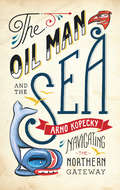- Table View
- List View
The Nordic Dimension of Energy Security
by Ryszard M. CzarnyThis book will show that when some countries begin using oil and gas as an instrument of exerting pressure and to realize political goals, energy security becomes synonymous with national security as well as economic security. It is within this context that the Nordic countries serve as role models and an exemplification of modern, innovative and ecofriendly solutions. This book highlights that the Nordic countries represent a very broad spectrum of competencies and techniques in the field of making use of various energy sources, which basically exhausts all the possible and currently available possibilities.
The North American Model of Wildlife Conservation (Wildlife Management and Conservation)
by Shane P. Mahoney and Valerius GeistThe foremost experts on the North American Model of Wildlife Conservation come together to discuss its role in the rescue, recovery, and future of our wildlife resources.At the end of the nineteenth century, North America suffered a catastrophic loss of wildlife driven by unbridled resource extraction, market hunting, and unrelenting subsistence killing. This crisis led powerful political forces in the United States and Canada to collaborate in the hopes of reversing the process, not merely halting the extinctions but returning wildlife to abundance. While there was great understanding of how to manage wildlife in Europe, where wildlife management was an old, mature profession, Continental methods depended on social values often unacceptable to North Americans. Even Canada, a loyal colony of England, abandoned wildlife management as practiced in the mother country and joined forces with like-minded Americans to develop a revolutionary system of wildlife conservation. In time, and surviving the close scrutiny and hard ongoing debate of open, democratic societies, this series of conservation practices became known as the North American Model of Wildlife Conservation.In this book, editors Shane P. Mahoney and Valerius Geist, both leading authorities on the North American Model, bring together their expert colleagues to provide a comprehensive overview of the origins, achievements, and shortcomings of this highly successful conservation approach. This volume• reviews the emergence of conservation in late nineteenth–early twentieth century North America• provides detailed explorations of the Model's institutions, principles, laws, and policies• places the Model within ecological, cultural, and socioeconomic contexts• describes the many economic, social, and cultural benefits of wildlife restoration and management• addresses the Model's challenges and limitations while pointing to emerging opportunities for increasing inclusivity and optimizing implementationStudying the North American experience offers insight into how institutionalizing policies and laws while incentivizing citizen engagement can result in a resilient framework for conservation. Written for wildlife professionals, researchers, and students, this book explores the factors that helped fashion an enduring conservation system, one that has not only rescued, recovered, and sustainably utilized wildlife for over a century, but that has also advanced a significant economic driver and a greater scientific understanding of wildlife ecology.Contributors: Leonard A. Brennan, Rosie Cooney, James L. Cummins, Kathryn Frens, Valerius Geist, James R. Heffelfinger, David G. Hewitt, Paul R. Krausman, Shane P. Mahoney, John F. Organ, James Peek, William Porter, John Sandlos, James A. Schaefer
The North Atlantic Polar Triangle: Documenting The End of an Epoch (Springer Polar Sciences)
by Matthew BamptonThis book explores the broad trajectory of the Holocene epoch in a region defined as the North Atlantic Polar Triangle (NAPT). The text is multi-disciplinary and synthetic, and focuses on the area extending from the North Pole to the Equator, and covers 60 degrees of longitude, encompassing the entire North Atlantic and significant parts of the land-masses that surround it. It discusses the physical, ecological and cultural history of the NAPT and its bordering regions after the end of the Last Glacial Maximum. It outlines the long-term changing relationships between environmental processes and humans within this single space, providing insight into the broader and more complex interactions happening globally. The author proposes, on the basis of the changes that can be documented in the NAPT, probable trajectories of change in other equally complex but less well-documented, and less geographically constrained Earth systems. It contributes to the ongoing discussion of human transformation of the world, and the current debate about the designation of a new geological epoch, the Anthropocene. It concludes by supporting the proposition that the Anthropocene is best understood as a boundary event, marking the upper limit of the Holocene, rather than as a new epoch. The intended audience includes physical geographers, anthropologists and readers exploring the synthetic analyses of the crisis humans currently confront as the world enters a period of extraordinary change
The Northridge Earthquake: Vulnerability and Disaster
by Robert Bolin Lois StanfordThis book provides a global view of the social effects of disaster in developed and developing countries. It focuses on the 1994 Northridge Earthquake in the US and other recent disasters to examine vulnerability and post-disaster recovery strategies. The authors also explore the ways state policy can reduce vulnerability in the future.
The Northwest Coastal Explorer: Your Guide to the Places, Plants, and Animals of the Pacific Coast
by Robert Steelquist“Part field guide, part travel guide, Steelquist writes with the authoritative voice of that friend you want next to you on the trail or in the dunes—the one who knows just where to go for a weekend getaway and what to pack for the Pacific Northwest’s unpredictable weather.” —Portland Monthly Millions of visitors explore the magnificent coastline of the Pacific Northwest and all that it provides—unique plant life, easy-to-find animals, and magical places. The Northwest Coastal Explorer is a fun, engaging, lushly-illustrated guide to the marine life of Oregon, Washington, and British Columbia. Profiles of the flora and fauna include tips on where and how to find them—like the ochre sea stars commonly discovered on exposed rocks and the olive snails found on sandy beaches—while the included getaway guide highlights the best weekend trips for each area.
The Nueces River: Río Escondido (River Books)
by Margie CrispFirst appearing on early Spanish maps as the Río Escondido, or hidden river, and later named Río de las Nueces after the abundant pecan trees along its banks, the Nueces today is a stream of seeming contradictions: a river that runs above and below ground; a geographic reminder of a history both noble and egregious; and a spring-fed stream transformed into a salty, steep-sided channel. <P><P>From its fresh, clear headwaters on the Edwards Plateau, Margie Crisp and William B. Montgomery follow the river through the mesquite and prickly pear of the South Texas Plains, to the river’s end in Nueces and Corpus Christi Bays on the Gulf of Mexico. With vivid prose and paintings, they record their travels as they explore the length of the river on foot, kayak, and fishing boat, ultimately weaving a vivid portrait of today’s Nueces. Capturing the river’s subtle beauty, abundant wildlife, diverse culture, and unique history of exploration, conflict, and settlement, they reveal the untold story of this enigmatic river with passion, humor, and reverence.
The Nutmeg's Curse: Parables for a Planet in Crisis
by Amitav Ghosh'Do not miss this book' NAOMI KLEIN, author of This Changes EverythingThe history of the nutmeg is one of conquest and exploitation - of both human life and the natural environment - and the origin of our contemporary climate crisis.Tracing the threats to our future to the discovery of the New World and the sea route to the Indian Ocean, The Nutmeg's Curse argues that the dynamics of climate change are rooted in a centuries-old geopolitical order constructed by Western colonialism. The story of the nutmeg becomes a parable revealing the ways human history has always been entangled with earthly materials - spices, tea, sugarcane, opium, and fossil fuels. Our crisis, Ghosh shows, is ultimately the result of a mechanistic view of the earth, where nature exists only as a resource for humans to use for our own ends, rather than a force of its own, full of agency and meaning.Writing against the backdrop of the global pandemic and the Black Lives Matter protests, Ghosh frames these historical stories in a way that connects our shared colonial past with the deep inequality we see around us today. By interweaving discussions on everything from the global history of the oil trade to the migrant crisis and the animist spirituality of indigenous communities around the world, The Nutmeg's Curse offers a sharp critique of contemporary society and speaks to the profoundly remarkable ways in which human history is shaped by non-human forces.
The Nutmeg's Curse: Parables for a Planet in Crisis
by Amitav Ghosh'Do not miss this book' NAOMI KLEIN, author of This Changes EverythingFrom the bestselling author of the Ibis trilogy and The Great Derangement, The Nutmeg's Curse is an enthralling, panoramic history of the influence of colonialism on the world today, told through the surprising story of the nutmeg.The history of the nutmeg is one of conquest and exploitation - of both human life and the natural environment - and the origin of our contemporary climate crisis.Tracing the threats to our future to the discovery of the New World and the sea route to the Indian Ocean, The Nutmeg's Curse argues that the dynamics of climate change are rooted in a centuries-old geopolitical order constructed by Western colonialism. The story of the nutmeg becomes a parable revealing the ways human history has always been entangled with earthly materials - spices, tea, sugarcane, opium, and fossil fuels. Our crisis, Ghosh shows, is ultimately the result of a mechanistic view of the earth, where nature exists only as a resource for humans to use for our own ends, rather than a force of its own, full of agency and meaning.Writing against the backdrop of the global pandemic and the Black Lives Matter protests, Ghosh frames these historical stories in a way that connects our shared colonial histories with the deep inequality we see around us today. By interweaving discussions on everything from the global history of the oil trade to the migrant crisis and the animist spirituality of indigenous communities around the world, The Nutmeg's Curse offers a sharp critique of contemporary society and speaks to the profoundly remarkable ways in which human history is shaped by non-human forces.(P) 2021 Hodder & Stoughton Limited
The Nutmeg's Curse: Parables for a Planet in Crisis
by Amitav GhoshThe author of The Great Derangement finds the origins of our climate crisis in Western colonialism&’s violent exploitation of human life and the environment. A powerful work of history, essay, testimony, and polemic, Amitav Ghosh&’s new book traces our contemporary planetary crisis back to the discovery of the New World and the sea route to the Indian Ocean. The Nutmeg&’s Curse argues that the dynamics of climate change today are rooted in a centuries-old geopolitical order constructed by Western colonialism. At the center of Ghosh&’s narrative is the now-ubiquitous spice nutmeg. The history of the nutmeg is one of conquest and exploitation—of both human life and the natural environment. In Ghosh&’s hands, the story of the nutmeg becomes a parable for our environmental crisis, revealing the ways human history has always been entangled with earthly materials such as spices, tea, sugarcane, opium, and fossil fuels. Our crisis, he shows, is ultimately the result of a mechanistic view of the earth, where nature exists only as a resource for humans to use for our own ends, rather than a force of its own, full of agency and meaning. Writing against the backdrop of the global pandemic and the Black Lives Matter protests, Ghosh frames these historical stories in a way that connects our shared colonial histories with the deep inequality we see around us today. By interweaving discussions on everything from the global history of the oil trade to the migrant crisis and the animist spirituality of Indigenous communities around the world, The Nutmeg&’s Curse offers a sharp critique of Western society and speaks to the profoundly remarkable ways in which human history is shaped by non-human forces.
The Observational Method in Civil Engineering: Minimising Risk, Maximising Economy
by Anthony O'Brien Alan PowderhamThe Observational Method (OM) is a natural and powerful technique that maximises economy while assuring safety. Its key features are highlighted in The Observational Method in Civil Engineering through eleven case histories from major infrastructure projects. They cover protection of adjacent structures including buildings and railway systems, bored and jacked tunnels, shafts and cofferdams, retaining walls, embankments, deep foundations, ground improvement and groundwater control. They illustrate how the OM can achieve more effective collaboration between the client and the design and construction teams, as well as how it can enhance the industry’s ability to learn from experience, thus improving future practice and stimulating innovation. Despite these advantages, the OM is significantly underused. The book demonstrates how the full potential of the OM can overcome a wide range of concerns and constraints. Other chapters address the advantages and limitations of the OM, the key role of progressive modification, the art of achieving agreement and the commercial and contractual environment. The book will appeal to a range of construction professionals, including civil, structural and geotechnical engineers, contractors and owners. It will also be of interest to students and researchers.
The Ocean Alphabet Book (Jerry Pallotta's Alphabet Books)
by Jerry PallottaLearn your ABCs in this aquatic exploration of everything under the sea. Best-selling author Jerry Pallotta delivers a fun first concepts book that covers sea creatures from A to Z. From speckled cod to jellyfish to the shiny shells of scallops, readers will be introduced to over twenty-six species that live in the North Atlantic Ocean. Jerry Pallotta&’s signature witty while scientifically accurate text paired with fun and detailed illustrations by Frank Mazzola Jr. make this a fun read aloud that kids and parents will be eager to dive into.
The Ocean Biome (The Living Ocean Series)
by Kathryn SmithymanThe four zones of the marine bio me,their plants and animals, coral reefs and estuaries, the importance of oceans to the Earth, and how they are in danger.
The Ocean Book: The Stories, Science, and History of Oceans (DK Nature Books)
by DKImmerse yourself in this beautiful, absorbing guide to the marine world. Earth owes its identity as the blue planet to the vast oceans of water that cover almost 70 percent of its surface. Home to an abundance of marine life and vital in regulating Earth's climate, the oceans are also the scene of daring exploits of exploration, intense rivalries between trading empires, and global warfare. Combining arresting photography; rich illustrations; and engaging, expertly written text, The Ocean Book showcases the landscapes; plants and animals; and captivating human stories of the world's oceans. Whether you're interested in blue whales, the El Nino climate oscillation, the search for the Northwest Passage, the sinking of Titanic, or pirates, this is the perfect exploration of the ocean realm.
The Ocean Is Kind of a Big Deal
by Nick SelukOh hey, guess what? New York Times bestseller Nick Seluk has a hilarious new nonfiction picture book all about the world's biggest ecosystem -- the ocean!Have you ever thought about everything the ocean does for you? It changes the weather, creates oxygen, provides food, and is a great place to have fun, too! So why is the ocean such a big deal? Because we couldn't live without it!This funny and factual picture book from Heart and Brain creator Nick Seluk explains the science behind the ocean: its plant and animal life, its contribution to the world, and what we can do every day to protect it. Humans wouldn't be able to survive without a healthy ocean. That's kind of a big deal.Each spread features bite-sized text and comic-style art with sidebars sprinkled throughout. Anthropomorphized marine animals help readers learn through funny jokes and comic panels. Funny, smart, and accessible, The Ocean Is Kind of a Big Deal is a must-have!
The Ocean and Coastal Conservation Guide 2005-2006: The Blue Movement Directory
by David HelvargA new environmental movement is emerging to help combat threats to America's oceans and coasts, with hundreds of local and regional groups as well as dozens of national and international organizations being formed. The Ocean and Coastal Conservation Guide represents a comprehensive guide to this new "Blue Movement." This one-of-a-kind new reference details more than 2,000 organizations and institutions that are working to understand, protect, and restore our ocean and coastal areas. For each entry, the book gives contact information including phone and fax numbers, email addresses, web addresses and a brief description of program areas of interest. Along with the state-by-state listings of groups, the directory includes three detailed sections that identify relevant government agencies, academic marine programs, and marine and coastal parks and protected areas. To be published biennially, The Ocean and Coastal Conservation Guide is a vital new resource for anyone interested in the growing community of people working to protect and restore our coastal lands and waters.
The Ocean and Cryosphere in a Changing Climate: Special Report of the Intergovernmental Panel on Climate Change
by Intergovernmental Panel on Climate Change (IPCC)The Intergovernmental Panel on Climate Change (IPCC) is the leading international body for assessing the science related to climate change. It provides policymakers with regular assessments of the scientific basis of human-induced climate change, its impacts and future risks, and options for adaptation and mitigation. This IPCC Special Report on the Ocean and Cryosphere in a Changing Climate is the most comprehensive and up-to-date assessment of the observed and projected changes to the ocean and cryosphere and their associated impacts and risks, with a focus on resilience, risk management response options, and adaptation measures, considering both their potential and limitations. It brings together knowledge on physical and biogeochemical changes, the interplay with ecosystem changes, and the implications for human communities. It serves policymakers, decision makers, stakeholders, and all interested parties with unbiased, up-to-date, policy-relevant information. This title is also available as Open Access on Cambridge Core.
The Ocean and Us
by Farah ObaidullahThe Ocean and Us provides an overview of our contemporary understanding of the ocean and all the ways our lives interact with it. It is intended for everyone with an interest in our blue planet. The book brings together the expertise of over 35 ocean specialists from around the world. It explores a wide variety of themes including the importance of a healthy ocean in the fight to halt and contain climate change. It covers issues such as overfishing and pollution, as well as emerging themes such as the blue economy, marine animal welfare and how we can leverage innovation to protect the ocean. The book provides an overview of some of the world’s iconic threatened and at risk ocean ecosystems, and outlines current governance structures and ocean management tools. It also discusses the important social dimensions between people and the ocean, such as ocean and human wellbeing, communities and the ocean, and who gets to participate in the ocean space. The book aims to enhance ocean literacy by making specialist concepts accessible to non-experts, with a view to empowering concerned citizens everywhere to come into action for the ocean, and pave a better way forward for humanity.
The Ocean in Motion: Circulation, Waves, Polar Oceanography (Springer Oceanography Ser.)
by Manuel G. Velarde Roman Yu. Tarakanov Alexey V. MarchenkoThis book commemorates the 70th birthday of Eugene Morozov, the noted Russian observational oceanographer. It contains many contributions reflecting his fields of interest, including but not limited to tidal internal waves, ocean circulation, deep ocean currents, and Arctic oceanography.Special attention is paid to studies on internal waves and especially those on tidal internal waves in the Global Ocean. These papers describe the most important open problems concerning experimental studies of internal waves and their theoretical, numerical, and laboratory modeling.Further contributions investigate the physics of surface waves and their interaction with internal waves. Here, the focus is on describing interaction processes between internal waves and deep currents in the ocean, especially currents of Antarctic Bottom Water in abyssal fractures. They also touch on the problem of oceanic circulation and related processes in fjords, including those occurring under sea ice. Given its breadth of coverage, the book will appeal to anyone interested in a survey of ocean dynamics, ranging from historic perspectives to modern research topics.
The Ocean of Life: The Fate of Man and The Sea
by Callum RobertsA Silent Spring for oceans, written by "the Rachel Carson of the fish world" (The New York Times) Who can forget the sense of wonder with which they discovered the creatures of the deep? In this vibrant hymn to the sea, Callum Roberts—one of the world’s foremost conservation biologists—leads readers on a fascinating tour of mankind’s relationship to the sea, from the earliest traces of water on earth to the oceans as we know them today. In the process, Roberts looks at how the taming of the oceans has shaped human civilization and affected marine life. We have always been fish eaters, from the dawn of civilization, but in the last twenty years we have transformed the oceans beyond recognition. Putting our exploitation of the seas into historical context, Roberts offers a devastating account of the impact of modern fishing techniques, pollution, and climate change, and reveals what it would take to steer the right course while there is still time. Like Four Fish and The Omnivore’s Dilemma, The Ocean of Life takes a long view to tell a story in which each one of us has a role to play. .
The Ocean of Tomorrow: The Transition to Sustainability – Volume 2 (Environment & Policy #57)
by Phoebe KoundouriAs a response to the climate crisis and its effect on marine ecosystems and coastal populations, this book proposes concrete science driven solutions at establishing transformation pathways towards Sustainable Blue Growth, that are supported by technically and socially innovative innovations. This book proposes investment options and management solutions that have the potential of making our seas and oceans resilient to crises- climate, financial, health- by laying the foundations for a green/blue, circular economy that is anchored in science driven solutions and geared toward public well-being. Now is the time to usher in systemic economic change and the good news is that we have our blueprint: it’s the combination of UN Agenda 2030 (17 SDG) and European Commission’s European Green Deal! There is no doubt that the Earth’s survival will depend on the protection and sustainable management of our seas and oceans and the resources they provide. This is recognized by the Joint Communication on International Ocean Governance, which is an integral part of the EU’s response to the United Nations’ 2030 Agenda for Sustainable Development, and in particular to the targets set out by Sustainable Development Goal 14 (SDG 14) to “conserve and sustainably use the oceans, seas and marine resources”. The analytical framework and science-driven concrete management solutions proposed in this book can accelerate the transition to a sustainable management of our seas and oceans, by turning the current challenges into opportunities for sustainable economic growth which is both environmentally resilient and leaves no one behind.
The Oceans Atlas (DK Pictorial Atlases)
by DKDelve beneath the world&’s oceans to discover their physical features, wildlife, and threats to their future.How do waves form? Where is the deepest part of the ocean? What is a black smoker? What would the ocean floor look like without water? What lives in a coral reef? If you find yourself seeking the answers to these questions, then this may be the book for you!Introducing The Oceans Atlas – a beautifully illustrated guide to Earth&’s oceans for kids aged 9-12. Explore key features of the oceans from seafloor to surf, including tides and trenches, currents and coastline, volcanoes and vents. Discover the variety of marine life from the biggest sharks and whales to the tiniest invertebrates and polyps. Find out the human impact on our seas and how we can create a healthier and cleaner future.Dive straight into this ocean book for kids, offering: - An illustrated guide to the innermost depths of our oceans that shows details not visible in photographs.- A variety of maps from seafloor topography and cross-sections to shipping routes and ocean resources. - Original and retro-feel illustration style combined with modern fonts which creates a different approach compared to photographic or CGI-based books.From coral reefs to hazardous seas, The Oceans Atlas is an engaging, fact-packed guide for children aged 9–12, especially those interested in natural science, geography, or ecology. So whether you&’re a budding young geographer, or a teacher looking for an engaging resource to use in your classroom, this oceans encyclopedia is full of fascinating facts to impress young readers time and time again. At DK, we believe in the power of discovery. So why stop there? If you like The Oceans Atlas, then why not complete the collection? Take a peek inside the beautiful and absorbing world of birds with The Bird Atlas, explore the complex animal kingdom with The Animal Atlas, reveal the inner workings of the human body with The Body Atlas and take a trip around the globe with The Earth Atlas.
The Oceans and Environmental Security: Shared U.S. And Russian Perspectives
by Raphael V. Vartanov Suzanne M. Demisch Artemy A. Saguirian Tom Tietenburg James Broadus Matthew J. LamourieThe concept of environmental security, drawing on the widely understood notion of international strategic interdependence (in facing, for example, threats of nuclear war or economic collapse) is gaining currency as a way of thinking about international environmental management.In 1989, the Institute for World Economy and International Relations of the Russian Academy of Sciences and the Marine Policy Center of Woods Hole Oceanographic Institution instituted a joint project to examine environmental security as it applies to the world's oceans. The Oceans and Environmental Security is a unified expression of their findings.The oceans, as global commons, are of central importance to issues of international environmental security. Critical problems are those that are likely to destabilize normal relations between nations and provoke international countermeasures. As such, the book focuses on seven specific concerns: land-based marine pollution North Pacific fisheries depletion hazardous materials transport nuclear contamination the Arctic Ocean the Southern Ocean and Antarctica the Law of the Sea
The Oceans: A Deep History
by Eelco J. RohlingThe 4.4-billion-year history of the oceans and their role in Earth's climate systemIt has often been said that we know more about the moon than we do about our own oceans. In fact, we know a great deal more about the oceans than many people realize. Scientists know that our actions today are shaping the oceans and climate of tomorrow—and that if we continue to act recklessly, the consequences will be dire. In this timely and accessible book, Eelco Rohling traces the 4.4 billion-year history of Earth’s oceans while also shedding light on the critical role they play in our planet’s climate system.Beginning with the formation of primeval Earth and the earliest appearance of oceans, Rohling takes readers on a journey through prehistory to the present age, vividly describing the major events in the ocean’s evolution—from snowball and greenhouse Earth to the end-Permian mass extinction, the breakup of the Pangaea supercontinent, and the changing climate of today. Along the way, he explores the close interrelationships of the oceans, climate, solid Earth processes, and life, using the context of Earth and ocean history to provide perspective on humankind’s impacts on the health and habitability of our planet—and on what the future may hold for us.An invaluable introduction to the cutting-edge science of paleoceanography, The Oceans enables you to make your own informed opinions about the environmental challenges we face as a result of humanity’s unrelenting drive to exploit the world ocean and its vital resources.
The Octopus in the Parking Garage: A Call for Climate Resilience
by Rob VerchickOne morning in Miami Beach, an unexpected guest showed up in a luxury condominium complex’s parking garage: an octopus. The image quickly went viral. But the octopus—and the combination of infrastructure quirks and climate impacts that left it stranded—is more than a funny meme. It’s a potent symbol of the disruptions that a changing climate has already brought to our doorsteps and the ways we will have to adjust.Rob Verchick examines how we can manage the risks that we can no longer avoid, laying out our options as we face climate breakdown. Although reducing carbon dioxide emissions is essential, we need to adapt to address the damage we have already caused. Verchick explores what resilience looks like on the ground, from early humans on the savannas to today’s shop owners and city planners. He takes the reader on a journey into the field: paddling through Louisiana’s bayous, hiking in one of the last refuges of Joshua trees in the Mojave Desert, and diving off Key Largo with citizen scientists working to restore coral reefs. The book emphasizes disadvantaged communities, which bear the brunt of environmental risk, arguing that building climate resilience is a necessary step toward justice.Engaging and accessible for nonexpert concerned citizens, The Octopus in the Parking Garage empowers readers to face the climate crisis and shows what we can do to adapt and thrive.
The Oil Man and the Sea: Navigating the Northern Gateway
by Arno KopeckyA sailing trip along the proposed Northern Gateway marine route with a fresh new voice in non-fiction.With oil and gas behemoth Enbridge Inc.'s Northern Gateway proposal nearing approval, supertankers loaded with two million barrels of oil may soon be plying the waters from northern British Columbia down the wild Pacific Coast. <P><P>This region is home to the largest tract of temperate rainforest on earth, First Nations who have lived there for millennia, and some of the world's most biodiverse waters-one spill is all it will take to erase ten thousand years of evolution.Arno Kopecky and his companions travel aboard a forty-one-foot sailboat exploring the pristine route-a profoundly volatile marine environment that registered 1,275 marine vessel incidents-mechanical failures, collisions, explosions, groundings, and sinkings-between 1999 and 2009 alone. Neither Kopecky nor the boat's owner have ever sailed before, yet they brave these waters alone when their captain leaves them part way through the journey.Written with Kopecky's quick humor and deft touch, this is a rich evocation of a mythic place and the ecology, culture, and history of a legendary region with a knife at its throat.
